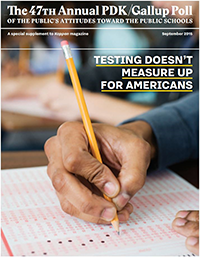18 Feb2016
By Kristin McCabe
 AACTE has chosen Matthew Ronfeldt of the University of Michigan School of Education to receive the 2016 AACTE Outstanding Journal of Teacher Education (JTE) Article Award for his article “Field Placement Schools and Instructional Effectiveness,” published in the September/October 2015 issue of the journal. The award will be presented at the 68th AACTE Annual Meeting Speaker Spotlight Session, Thursday, February 25, at The Mirage Hotel in Las Vegas.
AACTE has chosen Matthew Ronfeldt of the University of Michigan School of Education to receive the 2016 AACTE Outstanding Journal of Teacher Education (JTE) Article Award for his article “Field Placement Schools and Instructional Effectiveness,” published in the September/October 2015 issue of the journal. The award will be presented at the 68th AACTE Annual Meeting Speaker Spotlight Session, Thursday, February 25, at The Mirage Hotel in Las Vegas.
Ronfeldt’s study aimed to determine (a) what types of schools in an urban district are used most for preservice field placement, (b) what school characteristics make a difference in the effectiveness (gauged by value-added measures, or VAM, in reading and math) of the teachers placed there, and (c) whether teachers’ effectiveness corresponds to the degree of match between their preparation sites and the schools where they currently work.
19 Jan2016
By Zachary VanHouten
In a report released last week, Learning About Learning: What Every New Teacher Needs to Know, the National Council on Teacher Quality (NCTQ) evaluates four dozen teacher preparation textbooks for their content of specific student learning strategies. As an offshoot of the exercise, NCTQ will include a new standard, “Fundamentals of Instruction,” for secondary programs in its 2016 Teacher Prep Review.
For Learning About Learning, NCTQ reviewed 48 “relevant textbooks” used at just 28 institutions of higher education to determine whether they include six of the strategies identified as effective by the Institute of Education Sciences’ Organizing Instruction and Study to Improve Student Learning: A Practice Guide (2007). Finding little of what NCTQ sought, the report contends that textbook authors and publishers (and the preparation programs that assign the texts) are “failing the teaching profession, students, and the public by neglecting to provide our next generation of teachers with the fundamental knowledge they need to make learning ‘stick.’” See also Education Week’s coverage of the new report.
19 Jan2016
By Jerrica Thurman
 Last month, AACTE concluded its two-part online series on the Common Core State Standards (CCSS) with a webinar discussing preparation of preservice teachers for CCSS in mathematics. The webinar highlighted ways to engage candidates in thinking mathematically, figuring things out the way their PK-12 students will need to do, and using mathematics in context to better assist students in their learning.
Last month, AACTE concluded its two-part online series on the Common Core State Standards (CCSS) with a webinar discussing preparation of preservice teachers for CCSS in mathematics. The webinar highlighted ways to engage candidates in thinking mathematically, figuring things out the way their PK-12 students will need to do, and using mathematics in context to better assist students in their learning.
The webinar, “Preparing Teacher Candidates for Common Core State Standards in Mathematics: The Sequel,” was presented December 15 by Reuben Asempapa from Ohio University along with Fran Arbaugh from Penn State University and Cynthia Vavasseur from Nicholls State University, and moderated by AACTE Senior Director Linda McKee. They discussed strategies for program leaders to work on their campuses to educate mathematicians and mathematics educators about the CCSS in mathematics and to bring them together to effectively prepare future teachers:
04 Dec2015
By Sharon Robinson

Today, USA Today published a special centerfold feature on literacy in America, accompanied by a digital campaign by Mediaplanet. I was pleased to have the opportunity to author a piece for the campaign, published as “Expanding Literacy Beyond Language Arts.” In the article I describe work that colleges of education are doing to boost literacy among America’s PK-12 students. The 275 words available in USA Today scarcely begin to tell this story, but the message is an important one to get out. Here are a few additional words I’d like to share.
Literacy has become a keystone for all other learning, particularly because of our changing expectations around assessment. Beginning with the requirements of the No Child Left Behind Act and evolving into today’s college- and career-ready standards such as the Common Core and Next Generation Science Standards, students now must show competence in all disciplines via writing, speaking, and critical thinking.
17 Nov2015
By Amanda Lester
On November 3, the Wallace Foundation hosted a policy briefing in Washington, DC, to highlight findings from its recently released report, Developing Excellent School Principals to Advance Teaching and Learning: Considerations for State Policy. Commissioned by the Wallace Foundation and authored by Paul Manna, professor of government and policy at the College of William and Mary (VA), the report addresses the question What can state policy makers do to help ensure that schools have excellent principals who advance teaching and learning in their schools?
During the briefing, Manna presented findings from the report with a focus on the changing role of the principalship, the principal’s position as multiplier of effective teaching and leadership practice, and the impact of state policy making on principal effectiveness. Wallace Foundation President Will Miller underscored these perspectives in his introductory remarks: “There’s growing recognition that principals should no longer mainly be thought of as managers of buildings and bus schedules,” he said. “Indeed, effective leaders are their schools’ chief improvement officers—strengthening instruction, building a culture of high achievement, and supporting teachers and other educators to boost student performance.”
18 Sep2015
By Sharon Robinson
Sometimes the story is as good as the headlines, and sometimes it’s even better. The New York Times op-ed “Teachers Aren’t Dumb” (Sept. 8) by Psychologist Daniel T. Willingham is a case in point. As Willingham notes, contrary to popular belief, new teachers are solid academic performers. And as his article asserts, they can benefit from the research on effective teaching that is being conducted in the schools of education that prepare them. Willingham also points out—with rhetorical hyberbole—that not all preparation programs are using the latest research. While program quality varies, the excellent preparation provided by the universities whose researchers he cites illustrates that teacher education has strong exemplars. Unfortunately, Willingham does not acknowledge the widespread change within the education preparation community.
The direction of today’s preparation programs is truly good news. Willingham accurately identifies two guiding principles for improving teacher preparation and program accountability: evaluate programs based on graduates’ performance on a rigorous, credible culminating assessment, and base that assessment (and programs’ content) on evidence of what works best for student learning.
25 Aug2015
By Jerrica Thurman

AACTE’s more than 800 member institutions are dedicated to high-quality preparation that ensures the effectiveness, diversity, and readiness of professional educators, supporting the priorities of the American public surveyed in the 47th annual PDK/Gallup Poll of the Public’s Attitudes Toward the Public Schools. The recently released 2015 poll included questions on teacher quality and evaluation, standards, testing, and more, and a new online polling format captured selected demographic information, allowing for more disaggregated responses than past surveys.
The survey shows that 95% of Americans consider the quality of teachers to be very important and an integral factor for improving public schools. As in past years, an overwhelming majority of the U.S. public also is pleased with the performance of their local schools. Testing is viewed less favorably, though, including for teacher accountability purposes; 55% of Americans and 61% of public school parents oppose using student scores on standardized tests as part of teacher evaluations. Respondents also are skeptical of federal policy influences on public schools and of the Common Core State Standards.
23 Jul2015
By Linda McKee
Last weekend, I was privileged to represent AACTE on a panel at the conference of the International Literacy Association (ILA). Our session, titled “Cultivating Literacy Achievement Through Quality Teacher Preparation,” touched on current program-improvement efforts, revision of the ILA standards for program recognition, variations in licensure requirements across the country, and policy-related challenges.
Joining me for the discussion were William Teale of the University of Illinois at Chicago, Rita Bean of the University of Pittsburgh (PA), Bryan Joffe of the School Superintendents Association, Chris Koch of the Council for the Accreditation of Educator Preparation, and others.
07 Jul2015
By Tim Finklea
More than 200 participants from a variety of education settings just completed the first Online Professional Seminar (OPS) in the series being offered by AACTE’s new Quality Support Initiative. With another 250-plus registrants signed up for the second free seminar starting next week, the series is off to a strong start—and there is still space in upcoming cohorts!
The focus of each OPS is a topic relating to quality assessment and/or accreditation. Seminars are 3-week, interactive online courses for current and aspiring professional educators, PK-16. Courses are open to all educators, whether AACTE members or nonmembers, and the first two seminars in the series—Building Quality Assessments and Using Data for Improvement—are offered free of charge. These two introductory OPSs can be taken in any order.
29 Jun2015
By Kristin McCabe
The model standards of the Interstate School Leaders Licensure Consortium (ISLLC), developed in 1996 by the Council of Chief State School Officers (CCSSO) and last revised in 2008, generated controversy in the field during their most recent revision effort last fall and this spring. The National Policy Board for Education Administration (NPBEA), which convenes an array of stakeholder groups, is partnering with CCSSO to consider the feedback received from the field and make final adjustments to the new standards, now planned for release this fall.
NPBEA was among the groups that approved the original standards nearly 20 years ago and has been involved to some degree in subsequent revisions. Its constituent organizations* all have close connections to the work addressed in the standards, but some of these constituents felt their voices were not heard in the recent standards update.
19 May2015
By Kristin McCabe
The Council of Chief State School Officers (CCSSO) invites feedback on the latest revision of the Interstate School Leaders Licensure Consortium (ISLLC) model standards. Comments are due Friday, May 29.
The update attempts to capture the changing expectations for school leaders, who are increasingly held responsible not only for administrative tasks but also for student learning. The model standards, according to the draft document,
[. . .] clarify the most important work and responsibilities of learning-focused leaders operating in today’s education context. Grounded in both research and effective practice, these standards provide a framework for state departments of education and districts alike to understand how to best prepare, support, and evaluate education leaders in their efforts to help every child reach his or her fullest potential. [. . .] The standards can also inform how schools and districts recruit and cultivate leaders who can build teams that share and distribute the responsibilities required for high levels of student learning and achievement to occur. (p. 3)
10 Nov2014
By Omar Davis
The third annual edTPA National Implementation Conference, held last month in Los Angeles, drew nearly 400 educators and policy leaders from 28 states and more than 100 universities.
Convened at the University of California Los Angeles to accommodate record attendance, this year’s conference featured 32 plenary and breakout sessions, including a panel on how to promote and sustain partnerships between teacher preparation programs and cooperating PK-12 schools.
28 Oct2014
By Kristin McCabe
 Georgia, Ohio, Montana, New Hampshire, and Utah have been selected to receive technical assistance from the University of Florida College of Education’s Collaboration for Effective Educator Development, Accountability, and Reform (CEEDAR) Center. The center supports states in developing educators to prepare students with disabilities for colleges and careers.
Georgia, Ohio, Montana, New Hampshire, and Utah have been selected to receive technical assistance from the University of Florida College of Education’s Collaboration for Effective Educator Development, Accountability, and Reform (CEEDAR) Center. The center supports states in developing educators to prepare students with disabilities for colleges and careers.
16 Sep2014
By Kristin McCabe
The Council of Chief State School Officers (CCSSO) and National Policy Board for Educational Administration (NPBEA) have issued the following request for public comment on their draft revision of the Interstate School Leaders Licensure Consortium standards (see this post announcing the Wallace-funded revision effort). Make your voice heard by October 10!
CCSSO is seeking feedback from the public on draft standards for education leaders that aim to ensure district and school leaders are able to improve student achievement and meet new, higher expectations.
22 Aug2014
By Sharon Robinson
Yesterday, U.S. Secretary of Education Arne Duncan issued a statement responding to widespread concerns about standardized testing—saying that “testing issues today are sucking the oxygen out of the room in a lot of schools” and offering to delay by a year the federal requirement that teacher evaluations include some “significant” influence from students’ performance on state assessments.
 AACTE has chosen Matthew Ronfeldt of the University of Michigan School of Education to receive the 2016 AACTE Outstanding Journal of Teacher Education (JTE) Article Award for his article “Field Placement Schools and Instructional Effectiveness,” published in the September/October 2015 issue of the journal. The award will be presented at the 68th AACTE Annual Meeting Speaker Spotlight Session, Thursday, February 25, at The Mirage Hotel in Las Vegas.
AACTE has chosen Matthew Ronfeldt of the University of Michigan School of Education to receive the 2016 AACTE Outstanding Journal of Teacher Education (JTE) Article Award for his article “Field Placement Schools and Instructional Effectiveness,” published in the September/October 2015 issue of the journal. The award will be presented at the 68th AACTE Annual Meeting Speaker Spotlight Session, Thursday, February 25, at The Mirage Hotel in Las Vegas.






 Last month, AACTE concluded its two-part online series on the Common Core State Standards (CCSS) with a webinar discussing preparation of preservice teachers for CCSS in mathematics. The webinar highlighted ways to engage candidates in thinking mathematically, figuring things out the way their PK-12 students will need to do, and using mathematics in context to better assist students in their learning.
Last month, AACTE concluded its two-part online series on the Common Core State Standards (CCSS) with a webinar discussing preparation of preservice teachers for CCSS in mathematics. The webinar highlighted ways to engage candidates in thinking mathematically, figuring things out the way their PK-12 students will need to do, and using mathematics in context to better assist students in their learning.

 Georgia, Ohio, Montana, New Hampshire, and Utah
Georgia, Ohio, Montana, New Hampshire, and Utah